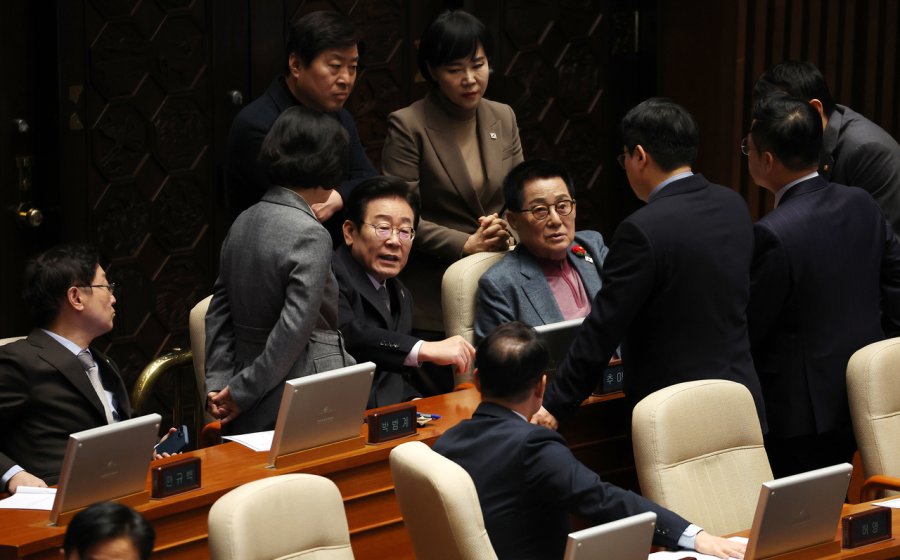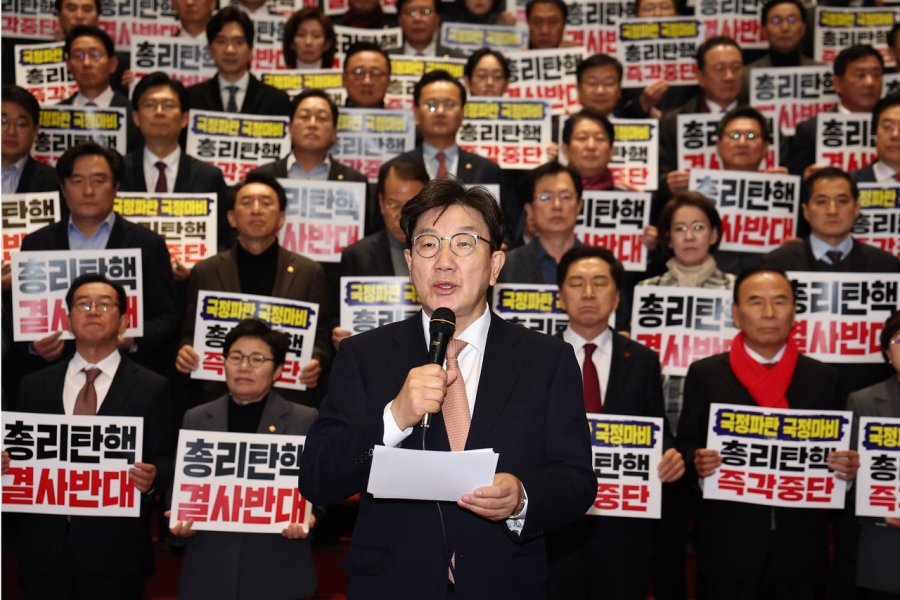December 27, 2024
Seoul – The main opposition Democratic Party of Korea pledged on Thursday to impeach acting President Han Deok-soo in a vote on Friday, after the prime minister refused to appoint any judicial candidates for President Yoon Seok-yeol’s impeachment trial without bipartisan agreement.
If the impeachment case is passed on Friday, the South Korean president's duties as prime minister and acting president will be suspended, with Deputy Prime Minister and Minister of Strategy and Finance Choi Sang-mok taking over the two positions.
The suspension of the acting president would be an unprecedented case in South Korea's history. It also triggered another intense political stalemate, as the ruling party strongly opposes the impeachment of South Korea's president and the appointment of Constitutional Court judges, while the opposition parties aim to fill court vacancies to lower the barriers to impeachment of Yoon Zheng.
The Democratic Party filed a motion to impeach South Korea's president on Thursday, saying the acting president was an “accomplice” in President Yoon's imposition of martial law on December 3.
Rep. Cho Seong-rae, a senior spokesman for the Democratic Party, said the party will “work hard to impeach Prime Minister South Korea tomorrow to restore South Korea's constitutional order and stabilize national affairs.” As the impeachment motion was reported to the opposition-controlled media at 2:07 p.m. Thursday Voting in the main chamber of Congress could technically begin as early as 24 hours.
Rep. Kwon Sung-dong, floor leader of the ruling People's Power Party, blasted the main opposition party for trying to “paralyze South Korea's diplomacy with the United States and Japan,” adding that his party would not tolerate impeachment attempts, which he called reckless. sexual, with the aim of overthrowing the government.
However, as of press time, no decision has been made on when the impeachment trial will take place or how many votes will be needed to impeach Han Kuo-yu.
The President of South Korea serves as both Acting President and Prime Minister. There are different opinions on whether the impeachment threshold is 151 or 200 votes, but National Assembly Speaker Woo Won-sik has the final say on the impeachment threshold of the South Korean President. There is no precedent for the Constitutional Court to exceed the threshold for impeaching an acting president.

During the motion to appoint Ma Eun-hyuk, the candidate for the Constitutional Court Justice, Lee Jae-myung (center), the leader of the main opposition party and member of the Democratic Party of Korea, was surrounded by opposition heavyweights such as Rep. Choo Mi-ae and Rep. Park Ji-won. A plenary meeting of the National Assembly was held at the National Assembly in western Seoul. Photo: Yonhap/Korea Herald
On Thursday, the main opposition Democratic Party of Korea, which holds 170 of the 300 seats in the National Assembly, led the passage of a bill to nominate three candidates for new Constitutional Court judges. On Thursday, only four of the party's 108 MPs attended the vote after the ruling People's Power party boycotted the vote.
Among the 195 members who participated in the vote, Seoul Western District Court President Jung Gye-sun and Seoul Western District Court senior judge Ma Eun-hyuk both received 193 votes in favor, while Cho Han received 193 votes in favor. It was approved by parliament in a vote of 6 to 6.
In a speech to the nation minutes before the parliamentary vote, Han said bipartisan compromise was a prerequisite for his appointment of new judges.
“I will postpone the decision to appoint a new Constitutional Court justice until the ruling party and the main opposition parties reach a compromise on the justice candidate,” Han said. “I will immediately appoint a new justice through a bill supported by compromise between the two parties.”
Han claimed that in the power vacuum caused by Yoon Eun-hye's impeachment, he “could subvert the constitutional order” by using executive power to appoint new Constitutional Court judges without the consent of both parties.
He also cited a precedent in which Hwang, who was acting president when disgraced former President Park Geun-hye was impeached in 2016, delayed the decision to appoint a Constitutional Court judge when there were eight sitting judges. Han said Huang's refusal at the time was based on the principle that otherwise it might affect the outcome of the impeachment court's verdict.
However, Speaker Oh, who was elected as a member of the Democratic Party in April this year, refuted President Han's remarks, saying that President Han's proposal violated the right to nominate candidates for National Assembly justices.
“(Han) was unable to provide any reason for delaying or refusing to appoint (court judges),” Wu said. “The acting president must carry out his duties from a common-sense perspective.”
In South Korea, the president has the power to appoint all nine Constitutional Court judges, but three must be appointed on the recommendation of the Supreme Court chief and the other three must be appointed by the National Assembly.
Wu added that in this regard, Han Kuo-yu's approval should be viewed as a mere formality that needs to be adhered to, rather than an attempt to change the constitutional order.

Rep. Kwon Sung-dong, acting speaker and floor representative of the People's Power Party, and members of the party protested after the plenary session of the National Assembly on Thursday against the main opposition party's attempt to pass a motion to impeach Acting President Han Deok-soo. Photo: Yonhap/Korea Herald
Earlier on Tuesday, the opposition party confirmed three justice candidates recommended by Yoon after he imposed martial law. The main opposition parties nominated Zheng Hema, while the ruling party nominated Zhao.
Opposition parties expect that measures to fill the vacancies in the Constitutional Court will lower the impeachment hurdle for President Yoon.
At least six justices must decide to grant an impeachment motion to remove a sitting president from office.
The Constitutional Court currently has only six sitting judges, meaning a unanimous decision is the only option to finally complete Yin's impeachment.
On the other hand, adding three justices would allow the court to support an impeachment motion even if there are three opponents.
People's Power party member Quan told reporters on Thursday that the opposition-controlled National Assembly's decision to pass the bill to fill court vacancies, which the ruling bloc often describes as a parliamentary dictatorship by the main opposition, could “greatly undermine the fairness of the courts.” sex”. Impeachment Trial” and “Abolition of the Court's Consideration of (Yin)'s Impeachment Motion.”
Power also said that Congress's recommendation of new judges is “equivalent to prosecutors' recommendation of court judges.”




